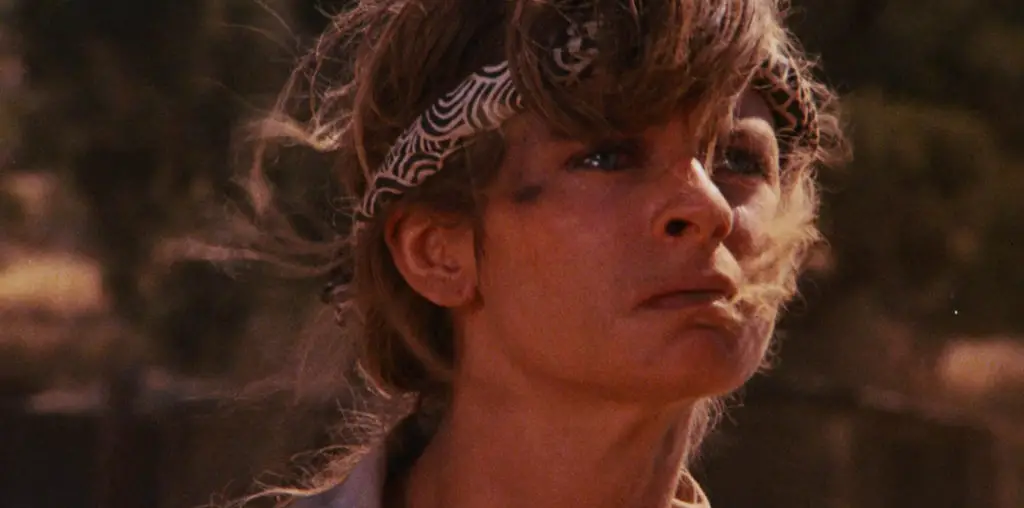
Thankfully, the name “Bobcat Goldthwait” and “filmmaking” no longer equal a punchline. Reviewers who covered Let Sleeping Dogs Lie and the nasty little joy World’s Greatest Dad used the fact as an attention grabber, even long after the effect began to die off. Goldthwait’s distinctive style should leave no one questioning the value of this comedian/actor-turned-filmmaker. He ponders his art and has the ability to execute ideas. The evidence is throughout the details.
One example: later on in his new film, God Bless America, the central character Frank (Joel Murray) rolls along in a car, during a dream sequence of equal parts Hollywood kitsch and Abraham Zapruder (note the slow-motion). On the soundtrack, a unique choice of song plays.
Few have scratched their heads when hearing an Alice Cooper tune on film. After all, this theatrical singer, in his best days, wrote songs to be seen when performed as well as heard. A subversive take on pop art, Alice Cooper was the first notable band to embrace visual performance fully and not merely exploit it to bolster the music. Hence, the band’s teen angst anthems “I’m Eighteen” and “School’s Out” appear regularly in films, while the little (never?) used “Hello, Hooray” shows up in Goldthwait’s scene mentioned above.
An odd choice for Cooper (written by Canadian Rolf Kempf, “Hello, Hooray” was originally performed by Judy Collins!), the song opens the album “Billion Dollar Babies” to cast the space of a Cooper performance, well known by 1973, into the minds of album and radio listeners. The song, with little description in the lyrics, is grand, self-indulgent, yet honest – in short, a statement on rock music: how listeners, with their own sense of elation, imagine the grander the feeling for performers like Alice Cooper. (Clever as the song choice is, Goldthwait – possibly is an attempt to prank the press – claims the song is accidental. When I asked him about it during a post-screening party hosted by Josh Goldbloom of Awesome Fest, Goldthwait said he wanted to use the more famous AC song “Elected,” but it was too expensive.) Many clever uses appear in the films of Goldthwait, a punk/metal enthusiast who spent time as a roadie. By using the song, Goldthwait creates a sublime moment for a character who knows a kind of apocalypse has already happened, and that his own is coming.
The greater apocalypse is an emotional one: humans survive, though in a mind-numbing bliss. The obvious culprit is inane media, specifically reality TV. But it’s hardly restricted to this. Impulsive consumerism (Frank’s neighbor rents an apartment yet drives a high-priced sports car), the (non)culture of the American office, and the greater lack of substance that Americans are happy to subsist on.
Really, there’s no there there anymore, as conversation regurgitates what someone heard or saw in the banal McDonald-ized media. Frank feels it all the more, as his life begins to fall apart: fired from his job, he’s divorced and distanced from his bratty daughter, and is soon diagnosed with a terminal illness. The AC song comes long after Frank has embraced his loss and begun his vengeance against the inane world, one mindless body at a time.
The film sounds like obvious satire: think Danny Devito’s Death to Smoochy that kills viewers with blows to the head. Yet, Goldthwait has a nice handle on satire via his use of black comedy. Once Frank pairs with Roxy (Tara Lynne Barr, who will grate on viewers sensitive to precocious teen performers), their killing spree plays like the kind of pleasing fantasy that many of us have grown out of but recall fondly. The mentorship angle of Frank to Roxy, though familiar (with direct connections to the films that inspired this one), helps ground GBA through a divided conscious – the run-down 50-something balancing the newer breed of malcontent.
As Frank, Joel Murray is saddled with most of the dialog, much of it invective that seem recursive. Even with a fine use of understatement, Murray gets weighed down in a film that shows its disgust better than the script tells it. While the content is familiar, this is a film that had to be made. Sometimes the truth isn’t so fresh, but it’s all we have.

